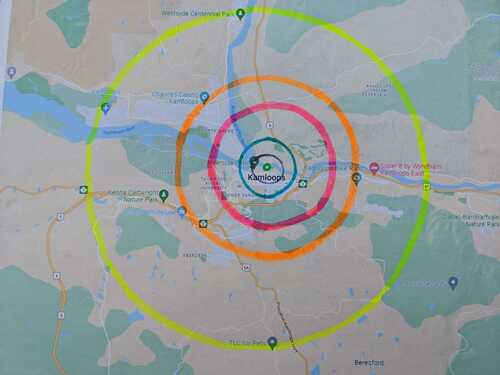How Search History and Location Affect Search Rankings
October 21st 2022

If you pay for SEO services for your website, it can come as an unwelcome shock to do a Google search for your industry and location, and find that your high-quality website doesn’t show up at all. As an online or small/local businesses owner, you will be interested to know that your personal search history and physical location often affect your site's rankings for certain types of keywords and situations. Let’s take a look at these together!
If you want to boost your website's local or regional SEO, contact us today for a FREE website review!
What is Search History?
When a user is logged into their Google account, Google will collect web, search, and app activity. You can opt-out of some of this data collection, but it is turned on by default. Visit myactivity.google.com to see and manage your own search history!
The data is mainly collected to personalize and tailor your online experience to better align with your interests. This personalization involves things like saving your search history, steering you toward relevant results, and picking up where you left off if you closed a tab or window. Overall, it is meant to provide a more comfortable, individual search experience across Google’s services.
Unless you have opted out of it, Google will store your search history data for up to 180 days. When you are logged into a Google account and you use their services, they will learn your recent search habits and prioritize these interests when delivering future results.
How Does Search History Affect Search Results?
User search history has been a factor in Google rankings as far back as 2007. [Source] If you regularly search for similar keywords, Google will begin offering results (and sometimes ads) based on your previous searches. The impact on your results is subtle, but once Google has your search data it will try to predict who and/or what you meant (your search intent) based on your previous queries.
This online behaviour can be misleading for business owners who have become used to searching their own name or industry keywords on a regular basis. Repeated searches can make a company appear favoured, and can cause them to move higher more slowly in the rankings that they see on their own device.
Pages that you visited previously from the links in Google’s search results will start to show up more and more in your results, frequently moving higher on the page, and potentially creating a false impression that a website page is ranked higher than it actually is.
Even if someone isn’t logged in, they may see different search results based on the history stored in their current browser session. Google will have less data to draw from here, but it will continue in its attempt to personalize the experience for users.
How Does My Physical Location Affect Search Results?
One of the primary factors that affects local results is distance from your location to nearby businesses.
Distance considers how far each potential search result is from the location term used in a query. If a user doesn’t specify a location in their search, then Google will calculate distance based on what they do know about the user’s location. Whether you have your location services turned on or not, Google can usually figure out roughly where you are.
In particular, this affects users when they type a query with the phrase "near me". This tells Google that the user is looking for the nearest businesses, and not necessarily the businesses that Google would typically show for that industry.
Similar to what we explained about search history, these “near me” or other location-focused types of searches can create a false impression about the ranking of a website. If you operate a restaurant and search for “restaurants near me” or “restaurants [city name]” while you’re sitting in your restaurant dining room, your business may show up first. If you do the same search while sitting in a different business, you may not show up at all.
SEO specialists often link the relevance of your website to search queries by including the location in the topic of the page. For websites, this means using keywords in your content, and particularly the introduction, that clearly define the location — keywords such as “Custom Web Development Kamloops”.
Customers can opt-out of sharing location data with Google, but most of us don’t. Most users who are searching for local businesses are looking for the closest and most convenient option. Allowing Google to see your location improves the results they can provide you. However, it’s a good idea to not worry too much about the ranking of your own business website when you’re using location-focused search terms like “near me”. Your own search results will never give you the full picture. We recommend you opt for a more complete SEO report instead.
If you need to make sure your business is ranking for your physical location, contact us today and ask for a FREE website review!
For more answers to common questions about SEO services, check out the Grassroots FAQ section of our blog!


